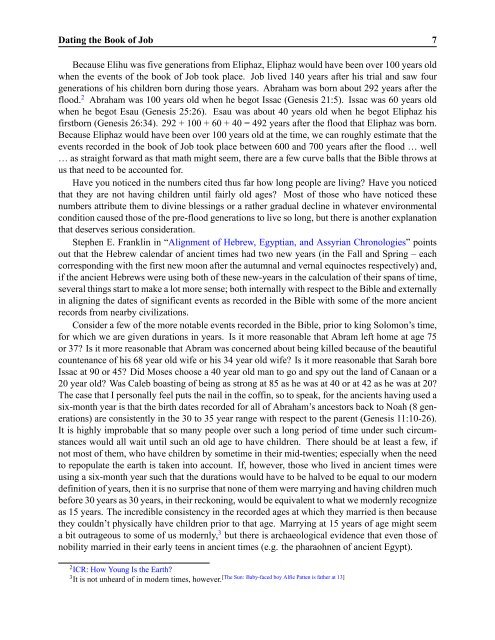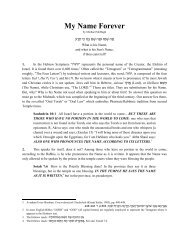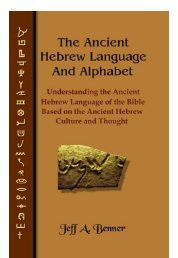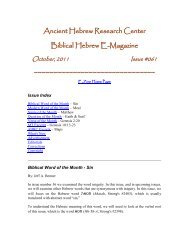Dating the Book of Job (PDF) - Ancient Hebrew Research Center
Dating the Book of Job (PDF) - Ancient Hebrew Research Center
Dating the Book of Job (PDF) - Ancient Hebrew Research Center
Create successful ePaper yourself
Turn your PDF publications into a flip-book with our unique Google optimized e-Paper software.
<strong>Dating</strong> <strong>the</strong> <strong>Book</strong> <strong>of</strong> <strong>Job</strong> 7<br />
Because Elihu was five generations from Eliphaz, Eliphaz would have been over 100 years old<br />
when <strong>the</strong> events <strong>of</strong> <strong>the</strong> book <strong>of</strong> <strong>Job</strong> took place. <strong>Job</strong> lived 140 years after his trial and saw four<br />
generations <strong>of</strong> his children born during those years. Abraham was born about 292 years after <strong>the</strong><br />
flood. 2 Abraham was 100 years old when he begot Issac (Genesis 21:5). Issac was 60 years old<br />
when he begot Esau (Genesis 25:26). Esau was about 40 years old when he begot Eliphaz his<br />
firstborn (Genesis 26:34). 292 + 100 + 60 + 40 = 492 years after <strong>the</strong> flood that Eliphaz was born.<br />
Because Eliphaz would have been over 100 years old at <strong>the</strong> time, we can roughly estimate that <strong>the</strong><br />
events recorded in <strong>the</strong> book <strong>of</strong> <strong>Job</strong> took place between 600 and 700 years after <strong>the</strong> flood … well<br />
… as straight forward as that math might seem, <strong>the</strong>re are a few curve balls that <strong>the</strong> Bible throws at<br />
us that need to be accounted for.<br />
Have you noticed in <strong>the</strong> numbers cited thus far how long people are living? Have you noticed<br />
that <strong>the</strong>y are not having children until fairly old ages? Most <strong>of</strong> those who have noticed <strong>the</strong>se<br />
numbers attribute <strong>the</strong>m to divine blessings or a ra<strong>the</strong>r gradual decline in whatever environmental<br />
condition caused those <strong>of</strong> <strong>the</strong> pre-flood generations to live so long, but <strong>the</strong>re is ano<strong>the</strong>r explanation<br />
that deserves serious consideration.<br />
Stephen E. Franklin in “Alignment <strong>of</strong> <strong>Hebrew</strong>, Egyptian, and Assyrian Chronologies” points<br />
out that <strong>the</strong> <strong>Hebrew</strong> calendar <strong>of</strong> ancient times had two new years (in <strong>the</strong> Fall and Spring – each<br />
corresponding with <strong>the</strong> first new moon after <strong>the</strong> autumnal and vernal equinoctes respectively) and,<br />
if <strong>the</strong> ancient <strong>Hebrew</strong>s were using both <strong>of</strong> <strong>the</strong>se new-years in <strong>the</strong> calculation <strong>of</strong> <strong>the</strong>ir spans <strong>of</strong> time,<br />
several things start to make a lot more sense; both internally with respect to <strong>the</strong> Bible and externally<br />
in aligning <strong>the</strong> dates <strong>of</strong> significant events as recorded in <strong>the</strong> Bible with some <strong>of</strong> <strong>the</strong> more ancient<br />
records from nearby civilizations.<br />
Consider a few <strong>of</strong> <strong>the</strong> more notable events recorded in <strong>the</strong> Bible, prior to king Solomon’s time,<br />
for which we are given durations in years. Is it more reasonable that Abram left home at age 75<br />
or 37? Is it more reasonable that Abram was concerned about being killed because <strong>of</strong> <strong>the</strong> beautiful<br />
countenance <strong>of</strong> his 68 year old wife or his 34 year old wife? Is it more reasonable that Sarah bore<br />
Issac at 90 or 45? Did Moses choose a 40 year old man to go and spy out <strong>the</strong> land <strong>of</strong> Canaan or a<br />
20 year old? Was Caleb boasting <strong>of</strong> being as strong at 85 as he was at 40 or at 42 as he was at 20?<br />
The case that I personally feel puts <strong>the</strong> nail in <strong>the</strong> c<strong>of</strong>fin, so to speak, for <strong>the</strong> ancients having used a<br />
six-month year is that <strong>the</strong> birth dates recorded for all <strong>of</strong> Abraham’s ancestors back to Noah (8 generations)<br />
are consistently in <strong>the</strong> 30 to 35 year range with respect to <strong>the</strong> parent (Genesis 11:10-26).<br />
It is highly improbable that so many people over such a long period <strong>of</strong> time under such circumstances<br />
would all wait until such an old age to have children. There should be at least a few, if<br />
not most <strong>of</strong> <strong>the</strong>m, who have children by sometime in <strong>the</strong>ir mid-twenties; especially when <strong>the</strong> need<br />
to repopulate <strong>the</strong> earth is taken into account. If, however, those who lived in ancient times were<br />
using a six-month year such that <strong>the</strong> durations would have to be halved to be equal to our modern<br />
definition <strong>of</strong> years, <strong>the</strong>n it is no surprise that none <strong>of</strong> <strong>the</strong>m were marrying and having children much<br />
before 30 years as 30 years, in <strong>the</strong>ir reckoning, would be equivalent to what we modernly recognize<br />
as 15 years. The incredible consistency in <strong>the</strong> recorded ages at which <strong>the</strong>y married is <strong>the</strong>n because<br />
<strong>the</strong>y couldn’t physically have children prior to that age. Marrying at 15 years <strong>of</strong> age might seem<br />
a bit outrageous to some <strong>of</strong> us modernly, 3 but <strong>the</strong>re is archaeological evidence that even those <strong>of</strong><br />
nobility married in <strong>the</strong>ir early teens in ancient times (e.g. <strong>the</strong> pharaohnen <strong>of</strong> ancient Egypt).<br />
2 ICR: How Young Is <strong>the</strong> Earth?<br />
3 It is not unheard <strong>of</strong> in modern times, however. [The Sun: Baby-faced boy Alfie Patten is fa<strong>the</strong>r at 13]






